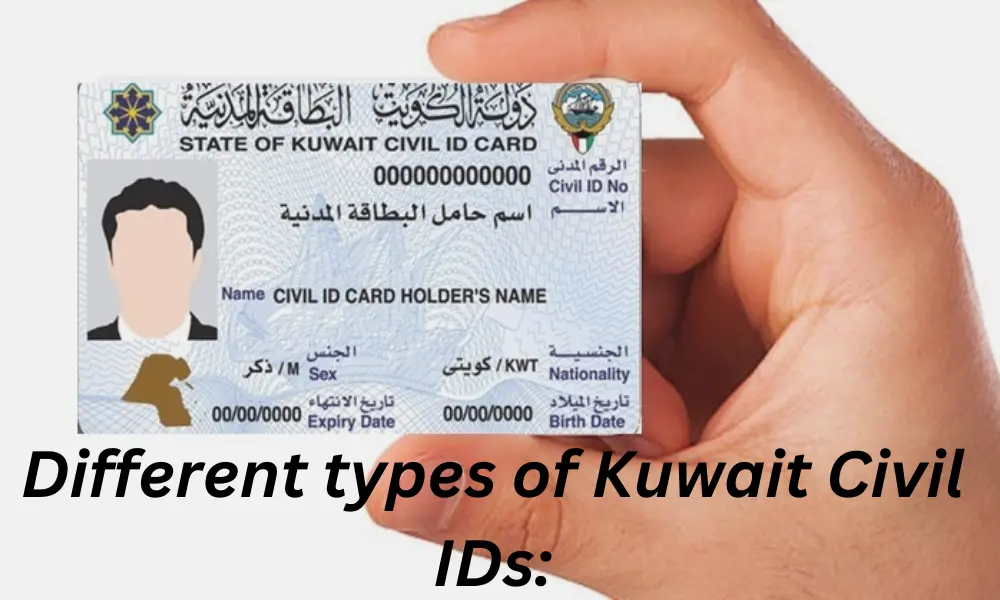What are the different types of Kuwait Civil IDs?
Are you a Kuwait resident or a KOC employee? A civil ID card is your passport in everyday life. Do you know that it can come in varieties? This guide demystifies the differences between the blue and yellow cards, so you know which captures who you are in the Kuwaiti hierarchy.
As for the rest, we will consider the validity periods of each type depending on your immigration status in the United States of America or your affiliation with the country. By the end of it, you would be able to intelligently and confidently approach Government services, Banking, and much more.
Different types of Kuwait Civil IDs:

Overview of the Kuwait Civil ID System:
Who needs Civil IDs and why:
In Kuwait, a Civil ID is like your official ID card – it’s essential for anyone living there, whether you’re a citizen or an expat. Think of it as your key to unlocking many things in Kuwait. It proves who you are and allows you to do important stuff, like opening a bank account, getting a job, using government services, or even renting an apartment. If you want to live a normal life in Kuwait, you’ll need a Civil ID.
Types of Kuwait Civil IDs:
Civil ID for Kuwaiti Citizens:
For Kuwaiti citizens, the Civil ID is a blue card—their official badge of citizenship. It holds all their important details, like name, date of birth, and address. This blue card acts as their key to government services, healthcare, and other benefits exclusive to Kuwaiti citizens.
It also serves as your primary ID for everyday activities like opening a bank account or getting a job. Think of it as your Kuwaiti passport to a smooth and secure life within the country.
Civil ID for Expatriates (Non-Kuwaiti Residents)
Expatriates living and working in Kuwait have their own Civil ID, distinguished by its yellow color. This card functions similarly to the blue ID for citizens, acting as your official form of identification in the country. It contains your details like name, nationality, and residency information.
The yellow Civil ID unlocks essential services for expats. You’ll need it to open a bank account, get a job, rent an apartment, and even access healthcare. Essentially, it’s your golden ticket to living a normal life in Kuwait as an expat.
Apply for a Kuwait Civil ID while outside Kuwait
Civil ID for Domestic Workers:
We also saw that some of these domestic workers in Kuwait may also be provided with a Civil ID, although not as frequently as blue and yellow IDs. This card is usually green and has a certain utility assignment. It serves as the legal document of identification of the domestic worker as a legal resident in Kuwait, which connects him or her to the employer, the sponsor.
This ID enables domestic workers to acquire some services or entitlements depending on the contract which they signed with their employer or the laws of Kuwait. However, one should not confuse that all domestic workers in Kuwait have Civil ID because registration with civil affairs may not be mandatory. That is the case depending on the specified employment status of the applicant and the specific rules and regulations governing employment at that particular time.
Civil ID for GCC Citizens:
Citizens from other Gulf Cooperation Council (GCC) countries like Saudi Arabia, UAE, or Qatar might get a special Civil ID in Kuwait. This ID (color may vary) makes life easier for them.
Imagine it as a VIP pass for GCC folks. It can give them some of the same perks as Kuwaiti citizens, like easier access to banking or some services. But, it’s not guaranteed for everyone and depends on agreements between Kuwait and their home country. Always check with Kuwaiti authorities for the latest info.
Special Categories and Provisions:
Civil ID for Dependents:
In Kuwait, dependents (like spouses or children) of citizens or expats don’t usually receive their own separate Civil ID. Instead, they’re often added to the Civil ID of their sponsor (usually the husband/father). This means their details are included on the sponsor’s ID card.
However, there might be some exceptions or future changes in regulations, so it’s always a good idea to check with the Public Authority for Civil Information (PACI) for the latest information.
Civil ID for Special Need Persons:
Regarding the ID card for the disabled, Kuwait does not have the standard Civil ID for PWDs, but they can request a different ID. This card recognizes disabled people and also may provide some privileges or social services for this category, which is given by the Public Authority for Disabled People. It is, however, necessary to mention that the procedure for acquiring this ID card is all different from the Civil ID.
Application and Renewal Process:
Initial Application:
Book an Appointment: Head to the Public Authority for Civil Information (PACI) website and schedule a time slot for your Civil ID application.
Gather Documents: Make sure you have all the required documents, like your passport, birth certificate (for newborns), and proof of residency. The exact requirements can vary depending on your situation (Kuwaiti citizen, expat, etc.), so check the PACI website for specifics.
Visit PACI: On your appointment day, head to the PACI office with your documents and fees. They’ll take your fingerprints and photo, and process your application.
Collect Your ID: Once everything’s approved, you’ll be notified to pick up your brand-new Civil ID!
Renewal Process:
In-Person Visit: Visit the PACI office with your existing identification, and supporting documents, if required, and check the documents list on PACI’s website based on one circumstance, and the renewal fee.
Phone Call: Call the PACI hotline (probably updated to a new number which they can be found at) and ask for instructions on how to renew by phone. Make sure you have your Civil ID number and other details on hand when using the application.
Online Renewal (for GCC Citizens only): As mentioned, the Kuwaiti government website could offer GCC citizens in Kuwait to renew online, but there is no guarantee. Note: Always consult PACI for the eligibility of obtaining the product as well as any other guidelines.
Common Issues and Troubleshooting:
Lost or Stolen Civil IDs:
If you lost or your Civil ID was stolen you must report the loss as soon as possible. The replacement procedure requires one to fill out forms, present identification details, and make some payment. This assists you in checking misuse of your lost or stolen ID.
Read details: How to replace a lost or stolen Civil ID:
Updating Information on Civil IDs:
Need to update your Kuwaiti Civil ID info (address, phone number, etc.)? Here’s a quick guide:
Yes, You Can Update: Both blue (citizens) and yellow (expats) IDs can be updated.
In-Person for Now: Currently, visit PACI with proof of changes (new lease for address) and any extra documents they require (check PACI website).
Process: Inform staff, fill out forms, pay fees, and wait for confirmation to collect your updated ID.
Stay Updated: Check PACI’s website for future online/phone update options.
FAQs
Conclusion:
Your Kuwaiti Civil ID is your key to life in Kuwait. This guide empowered you to understand its types, renewal, and updates. For the latest details, visit PACI’s website or contact them directly.
